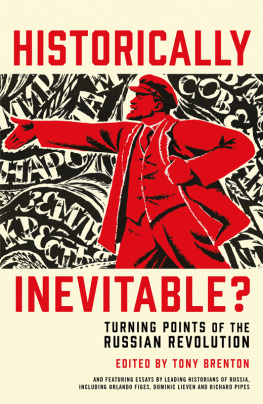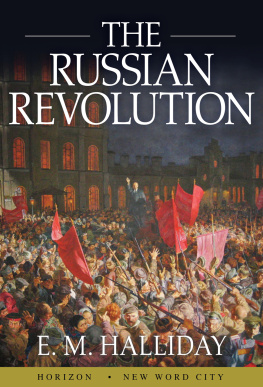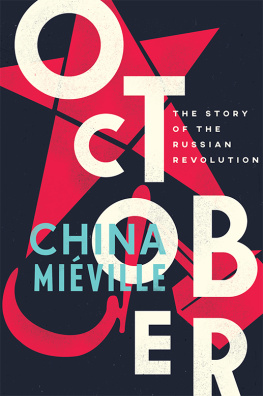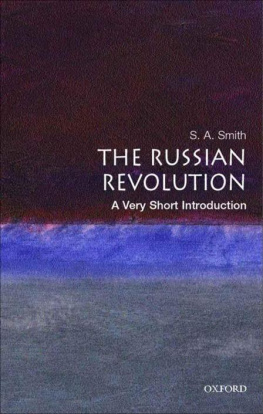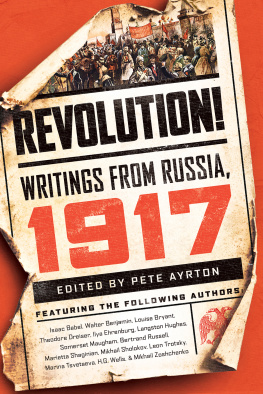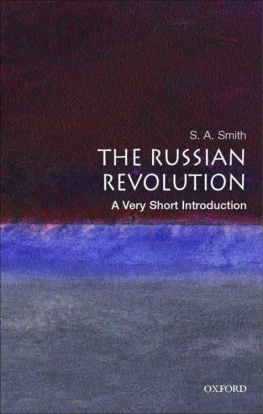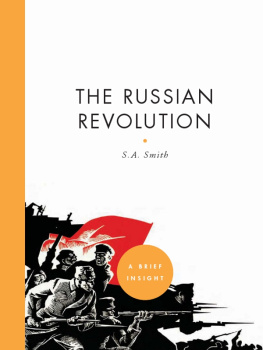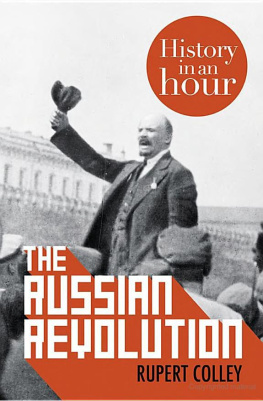HISTORICALLY INEVITABLE?
TONY BRENTON was a British diplomat from 1975 to 2009, completing his career as Charge dAffaires in Washington, and then Ambassador in Moscow. He is now a Fellow of Wolfson College Cambridge, writing a book on the Russia of Peter the Great, and is a regular commentator on contemporary Russian issues.
HISTORICALLY INEVITABLE?
TURNING POINTS OF THE RUSSIAN REVOLUTION
EDITED BY TONY BRENTON

First published in Great Britain in 2016 by
PROFILE BOOKS LTD
3 Holford Yard
Bevin Way
London
WC1X 9HD
www.profilebooks.com
Text copyright Profile Books Ltd, 2016
Selection copyright Tony Brenton, 2016
The moral right of the author has been asserted.
All rights reserved. Without limiting the rights under copyright reserved above, no part of this publication may be reproduced, stored or introduced into a retrieval system, or transmitted, in any form or by any means (electronic, mechanical, photocopying, recording or otherwise), without the prior written permission of both the copyright owner and the publisher of this book.
A CIP catalogue record for this book is available from the British Library.
eISBN 978 1 84765 859 3
,
(Russian revolt, mindless and merciless)
A. S. Pushkin
A NOTE TO THE READER
Prior to February 1918 Russia still used the Julian calendar (so called Old Style, OS) which was thirteen days behind the Gregorian calendar (New Style, NS) to which it then switched, bringing it in line with the West. Throughout this book dates for events in Russia are given Old Style up to February 1918 and New Style thereafter. In case of ambiguity we make clear whether OS or NS.
CHRONOLOGY
1905
9 Jan: Bloody Sunday.
10 Jan: Major wave of strikes and disturbances (continuing through year).
14 May: Battle of Tsushima, culminating Russian defeat in war with Japan.
5 Sept (NS): Treaty of Portsmouth ends Russo-Japanese war.
15 Oct: Witte offers draft political reforms to Tsar.
17 Oct: Tsar announces package of political reforms, including creation of Duma.
1906
16 April: Witte, having lost Tsars confidence, resigns as Prime Minister.
26 April: New Fundamental laws made public; Stolypin Minister of Interior.
27 April: First Duma opens.
8 July: First Duma dissolved; Stolypin Prime Minister.
AugNov: First round of Stolypin reforms.
1907
20 Feb: Second Duma opens.
March: Stolypin announces further reforms.
2 June: Second Duma dissolved; new electoral law.
7 Nov: Third Duma opens, runs to 1912.
1911
1 Sept: Stolypin shot; dies four days later.
1912
15 Nov: Fourth Duma opens.
1914
29 June: Assassination attempt on Rasputin.
1 Aug (NS): Germany declares war on Russia.
Late August: Major Russian defeats in Germany.
1915
AprilJuly: Germans invade Poland. A number of ministers, including Minister of war, replaced.
19 July: Duma reconvened for six weeks.
21 Aug: Unavailing demand from Ministers that Tsar let Duma form cabinet.
22 Aug: Tsar takes command of armed forces. Moves to HQ at Mogilev. Period of Tsaritsa Government begins.
3 Sept: Duma prorogued.
1916
JanNov: Empress/Rasputin oversee stream of rapid ministerial changes, including Minister of War, Interior Minister and Prime Minister (twice).
1 Nov: Duma reconvenes. Major attack by Kerensky on Rasputin and by Miliukov on top level stupidity or treason.
17 Dec: Rasputin murdered.
27 Dec: Yet another new Prime Minister.
1917
14 Feb: Duma reconvenes.
2324 Feb: Demonstrations in Petrograd provoked by bread shortage.
25 Feb: Demonstrations turn violent. Tsar (in Mogilev) orders suppression by force.
26 Feb: Army fires on crowd, killing forty. Part of garrison mutinies in protest. Tsar dismisses as panic Rodzyankos telegraphed demand for new government.
27 Feb: Most of Petrograd in hands of mutinous troops. Duma prorogued, but sets up Temporary Committee. Government dissolving. Tsar orders General Ivanov to proceed to Petrograd and put mutiny down. Organising meeting for Petrograd Soviet.
28 Feb: Tsar sets out for Tsarskoe Selo. First meeting of Petrograd Soviet. Disturbances spread to Moscow.
1 March: Imperial train diverted to Pskov. Arrives in the evening. Tsar, at urging of Alexeev, agrees to Duma based ministry and cancels Ivanovs mission. Meanwhile Duma and Soviet agree principles for establishment of Provisional Government. Formation of Moscow Soviet. Order No. 1 effectively strips military officers of most of their authority.
2 March: Provisional Government formed under Prince Lvov. Rodzyanko cables Ruzsky in Pskov to say abdication necessary. In course of morning Alexeev and other commanders endorse that advice. Nicholas accepts this and sends telegrams declaring Alexis Tsar. But with arrival of representatives of Duma changes mind and nominates Grand Duke Michael instead.
3 March: Michael decides not to accept crown. End of Romanov dynasty.
8 March: Nicholas returns to Tsarskoe Selo under arrest.
Late March: Britain withdraws offer of asylum to imperial family.
3 April: Lenin arrives in Petrograd, demands All power to the Soviets.
2021 April: April Days Petrograd riots, instigated by Bolsheviks, against Provisional Government, and particularly Foreign Minister Miliukov.
45 May: Formation of coalition government including socialist leaders. Miliukov out. Kerensky Minister of War.
16 June: Disastrous Kerensky Offensive launched.
2030 June: Rising tension in Petrograd as troops ordered to front.
34 July: July Days. Military mutiny. Demonstrators occupy Petrograd and threaten to overthrow Government. Lenin fails to give decisive lead. Demonstration fizzles out. Loyal troops arrive.
5 July: Lenin goes back into exile. Other Bolshevik leaders arrested.
7 July: Lvov resigns and names Kerensky as Prime Minister.
18 July: Kornilov appointed Commander in Chief.
31 July: imperial family depart for Tobolsk.
9 Aug: Elections and convocation of Constituent Assembly put back to November.
2627 Aug: Kerensky secures dictatorial powers, pronounces Kornilov traitor. Kornilov mutinies.
30 Aug: Release of imprisoned Bolsheviks ordered.
1 Sept: Kornilov arrested.
10 Oct: Bolshevik Central Committee, with Lenin present, votes to prepare to seize power.
2025 Oct: Bolsheviks in effect take control of Petrograd garrison.
24 Oct: Lenin, in disguise, makes way to Smolny in evening. Persuades Bolsheviks to launch coup.
2526 Oct: Storming of Winter Palace. Kerensky escapes to front to seek support. Other ministers arrested. Non-Bolshevik parties walk out of Congress of Soviets when announcement is made. Bolshevik government (Sovnarkom) with Lenin as chairman set up.
27 Oct: Opposition press outlawed.
28 Oct 2 Nov: Various anti-Bolshevik strikes and military actions (particularly in Moscow) overcome.
1230 Nov: Elections to Constituent Assembly. Socialist revolutionaries get 40 per cent, Bolsheviks 25 per cent.
20 Nov (OS): Armistice negotiations begin at Brest-Litovsk.
28 Nov: Demonstration in favour of Constituent Assembly. Constitutional Democrats banned and leaders arrested.
7 Dec: Cheka established.
Late December: Generals Alexeev and Kornilov found Volunteer (ie White) Army.
1918
5 Jan: Meeting of Constituent Assembly. Demonstration in support repressed. Assembly closed down late that night, and locked out the following morning.
15 Jan 3 March: Conclusion of Treaty of Brest-Litovsk. Lenin presses colleagues for acceptance of punitive terms, but only prevails when Germans renew their military offensive and demand even more concessions.
Next page
